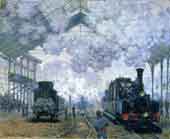
Claude Monet – The Gare St.-Lazare (1877)
theguardian.com. April 16, 2014. We have, it seems, no difficulty in dealing with the idea of cities, historically or in day-to-day life across the world. Cities are often iconic and in many ways define national identity. On the whole, we like them.
We have much more difficulty coming to terms with urbanisation – the process by which cities grow and change. China has just announced its very first “urbanisation policy”, while India is aggressively pursuing the idea of “smart cities”. Neither takes full account of the reality faced by the overwhelming majority of citizens caught in this turmoil of urban growth. As a result, such grand strategies risk perpetuating the social exclusion, inequity and precariousness of urban life.
We might be fascinated by cities, but we tend to see them in dichotomous ways. On one hand, they are held to be the key to economic growth and increased prosperity. There is a well-established school of city utopianism as exemplified by what Harvard economist Ed Glaeser calls “the triumph of the cities”. This notion of world cities as nodes in a network of transnational flows of capital, people and ideas is central to the neoliberal agenda.
Read more: http://www.theguardian.com/whose-city-is-it-anyway
See also The Guardian Cities Section: http://www.theguardian.com/cities
The Guardian Cities website is supported by the Rockefeller Foundation. The site offers a forum for debate and the sharing of ideas about the future of cities across the world. All content is editorially independent
![]() The Cyberhood’s mission is to encourage critical thinking about the the plight of communities of color, conditions in the inner city, and the problems of low-wage white workers. The website’s goal is to connect students, scholars, practitioners, and activists from across the racial and class divide in order to build meaningful relationships. The building of such connections, we believe, will strengthen the struggle to understand and transform inner cities and the metropolitan regions of which they are a part.
The Cyberhood’s mission is to encourage critical thinking about the the plight of communities of color, conditions in the inner city, and the problems of low-wage white workers. The website’s goal is to connect students, scholars, practitioners, and activists from across the racial and class divide in order to build meaningful relationships. The building of such connections, we believe, will strengthen the struggle to understand and transform inner cities and the metropolitan regions of which they are a part.

